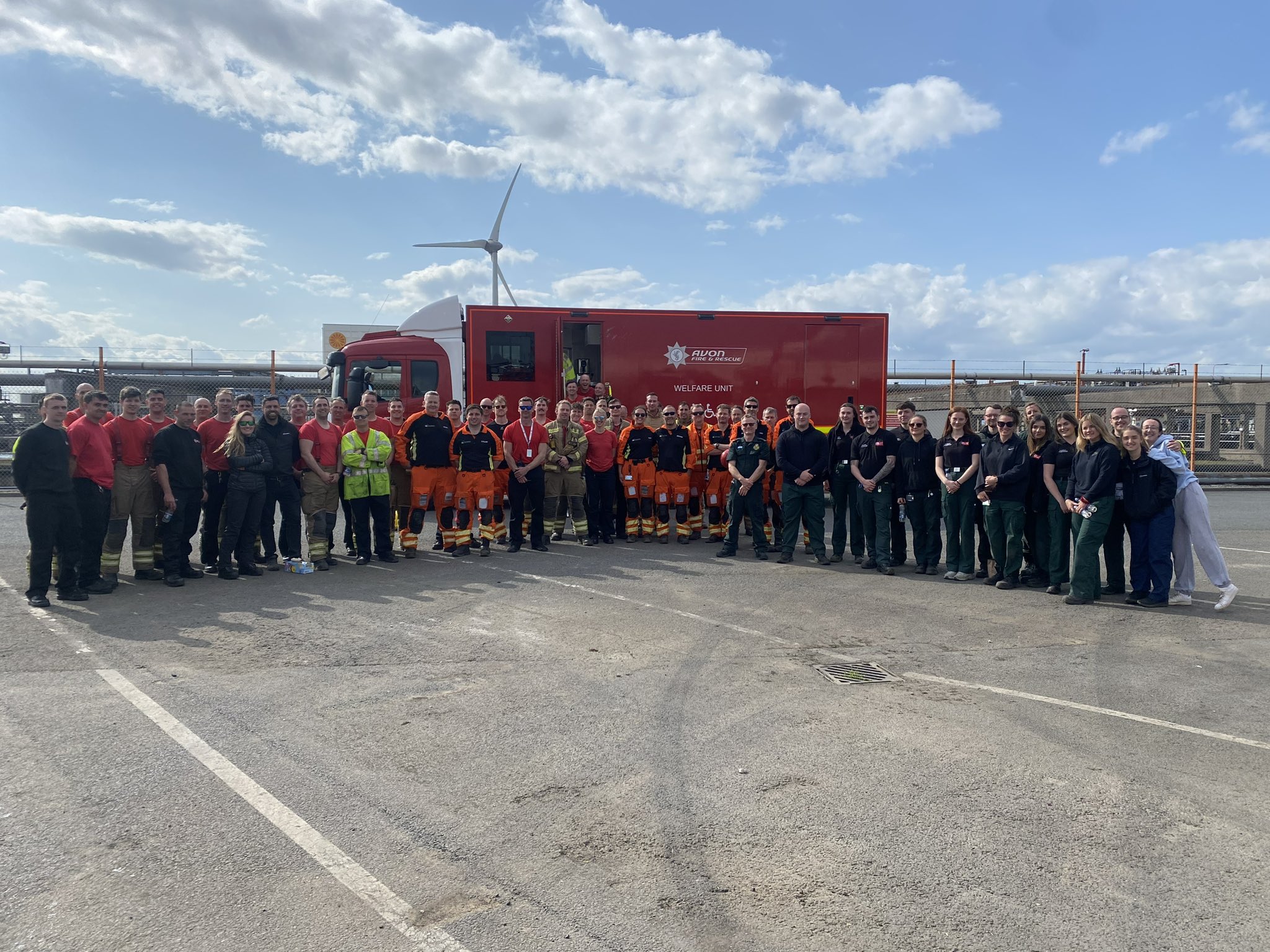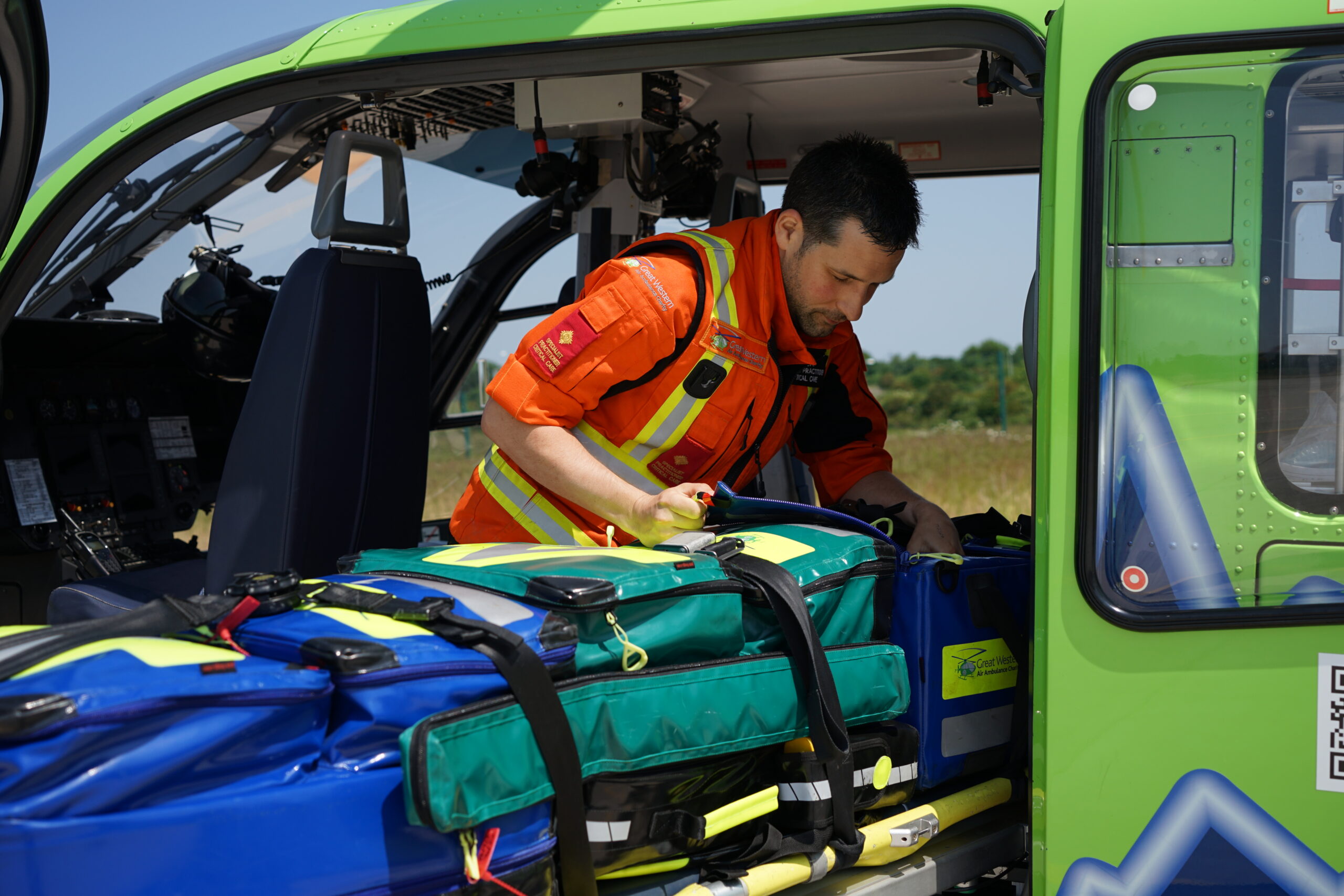
Multi-agency training day prepares crews for real-life emergencies
May 31, 2023
Crew believe new kit bags will help with patient care
June 16, 2023“Next thing I knew I woke up on the bed in the ambulance. I remember the doctor looking over me. I remember him saying, ‘You’re ok you’ve had a cardiac arrest.’ In my mind, I felt OK. The fact that someone was talking to me signalled I was alive and in good hands.”
A few days after celebrating his 60th birthday, Keith suffered a cardiac arrest as he walked off the pitch from his usual Friday night 5-a-side football. Two weeks after that, he was back at the venue – Bournside School in Cheltenham – thanking the people who helped save his life.
Just the usual Friday night game of football
On the evening of Friday 11 March 2022, Keith and his son Louis went to football together. They walked up to the pitch as normal for a warm-up and then split into three teams. It was when Keith’s team came off, that he collapsed.
Keith can’t remember the fifteen minutes before he collapsed, but he can remember coming around to find a Great Western Air Ambulance Charity (GWAAC) Critical Care Doctor looking down at him.
Luck was on Keith’s side
When Keith collapsed, two other players who knew first aid rushed to his side and performed immediate cardiopulmonary resuscitation (CPR). They undoubtedly helped save his life. Keith later learnt that despite one of them being a first aider for over 30 years, he’d done little more than stick on a plaster. Keith said, “He thanked me for being able to put his skills to proper use.”
Another stroke of luck happened that evening when Keith’s son Louis shouted for help and a parent from a youth team, who also happened to be a firefighter, ran over. Adam took control of the situation, calmed everyone down, and continued with CPR on Keith. In the meantime, one of the players rushed to the main sports centre reception to get the defibrillator. The defibrillator was then used on Keith under the guidance of firefighter Adam.
GWAAC Critical Care Team sets off at speed
Specialist Paramedic in Critical Care (SPCC) Fleur remembers the night well. She was working on the late shift with SPCC Matt and Critical Care Doctor, Professor Jonathan Benger.
They received the call and immediately jumped into one of GWAAC’s fully equipped critical care cars, arriving to find the land paramedics with Keith and with a good handle on the situation.
The incredible efforts of Keith’s teammates and the ambulance crews meant that Keith’s pulse was back when the GWAAC Critical Care Team got to him. He was still unconscious, so alongside the ambulance crew, the GWAAC team performed a heart trace and supported his breathing. They got Keith loaded into the ambulance and made the decision not to anaesthetise him because he was becoming more and more alert and started to complain about pain in his chest.
The team made a plan to administer pain relief, monitor his heart rhythm and keep him settled and comfortable for the journey to hospital.
SPCC Matt and Professor Benger travelled with Keith in the back of the ambulance so they could act quickly if he took a turn for the worse. And Fleur followed in the critical care car with Keith’s family who had been called and arrived at the scene.
Getting Keith to the right hospital
One of the most important decisions made by the GWAAC crew that night was which hospital to take Keith to. They knew that he had to get to the best hospital for his needs. After looking at his heart tracings both when he was in cardiac arrest and afterward, it was clear the main problem was his heart. The team organised for him to be transferred to the cardiac specialist hospital in Bristol, the Bristol Royal Infirmary (BRI) because that is where the Bristol Heart Institute is based.
It can sometimes be hard for those involved at the scene of a critically ill or injured person to understand why we wouldn’t take a patient to their nearest hospital. It is certainly quicker, and it means that a person is often closer to their loved ones.
That night, our crew knew that taking Keith to the emergency department at the BRI would give him the best continuation of specialist care and the best chance of recovering to enjoy living life to the full. Had he gone to his local hospital, he may then have needed to transfer to the BRI for any heart investigations or surgery which would have delayed his treatment and potentially changed his outcome.
Knowledge of the hospitals in our region and their specialisms plays an important role in the crew’s decision-making process at the scene.
Of course, until Keith came around in the ambulance, he was unaware of the help he had received from bystanders, paramedics and GWAAC. His biggest memory of that night, apart from looking up to find a GWAAC Critical Care Doctor staring down at him, was the pain in his chest from the CPR. He said, “I was struggling physically. But once in the BRI I recovered well.”
The days that followed
Keith stayed in hospital for a week and received “wonderful care.” Within a couple of days, he was up and about.
“I couldn’t help comparing myself to other patients with heart problems in the hospital – I count myself very lucky. I’m relatively healthy, I don’t smoke, I have a healthy lifestyle… maybe that’s why I recovered so quickly.”
His family was concerned that he might have some memory loss but aside from the fifteen minutes before his cardiac arrest, Keith’s memory hasn’t been affected. Their fears were allayed at the hospital when Keith said to Louis, “Did you pick up the car keys?” Keith remembered throwing them down at the side of the pitch before the game. The family thought, “He’s alright!”
A standing ovation
The football club, and Keith, wanted to present Firefighter Adam with a special award for his actions that night. Keith said that the standing ovation he received as he walked up to give Adam his award took him by surprise:
“That’s when it hit me. I welled up, I felt very emotional. I didn’t expect to feel emotional. We had a chat after, and Adam said luck was on my side. He also said he doesn’t often get to meet the people he helps from his day job.”
During the award presentation, Keith also met the lady who called 999 when he collapsed and several other parents who were there at the time.
I don’t dwell on it
In the days after his cardiac arrest, Keith said he had trouble understanding why it had happened to him; he thought he was relatively fit and healthy. He does acknowledge, however, that he’s in a better position now than he was before:
“I’ve been fully checked out, nothing else is underlying and my health is better now that I’ve had the stent fitted. I am back playing football regularly and despite my age I feel fitter now than I have for a long time.”
Keith reflects further: “I turned 60 just a few days before my cardiac arrest, so perhaps it wasn’t the best birthday present! But these days 60 is not that old. I’ll carry on playing football with my friends and my team, the Southside Star Super-Veterans 7-aside. My two sons and I are talking about climbing Ben Nevis at some point this year.”
“I didn’t realise that air ambulances are a mini hospital”
Until his cardiac arrest, Keith, like most people, was unaware of the differences between ambulances and air ambulances. He didn’t realise that GWAAC is a “mini hospital and that it has critical care cars, not just a helicopter.”
He appreciated the explanation given to him by GWAAC Supporter Engagement Coordinator, Emma, when he later visited GWAAC’s airbase. She told him how operators on the Helicopter Emergency Medical Services desk listen to 999 calls and know when to deploy an air ambulance crew.
“And I didn’t even realise GWAAC was a charity until I spoke to Emma!”
Keith said, “To be able to sit here and carry on with life as normal – I owe a great deal to GWAAC and the guys who acted quickly.” Sentiments that are echoed by Keith’s wife, Andrea, who reached out to GWAAC shortly after his cardiac arrest:
“Thank you to the crew from the bottom of our hearts. Their professional and personal care and kindness were incredible. Fleur was the most comforting and informative presence to have with us on what was in hindsight a very harrowing journey. We will never forget them and what they did for our family.”
The importance of CPR and defibrillation
SPCC Fleur said, “Keith is alive because people knew how to do CPR and he had a defibrillator used.”
Currently, only 10% of people who suffer an out-of-hospital cardiac arrest survive but receiving CPR within the first two minutes can double their chance of survival. Put simply, CPR is a way of moving blood to the brain which buys them more time.
Keith was lucky that he collapsed when and where he did, surrounded by people, and with some that knew how to do CPR and use a defibrillator. GWAAC is trying to improve the chances of survival for people who suffer an out-of-hospital cardiac by educating communities on how to do CPR and use a defibrillator.
The ability to make quick and decisive decisions takes practice and training. Find out more about how training allows our crew to be prepared for anything.
To be able to sit here and carry on with life as normal – I owe a great deal to GWAAC and the guys who acted quickly.

Keith (Yellow) doing what he loves. Playing football.

We attended Keith using one of our critical care cars.



